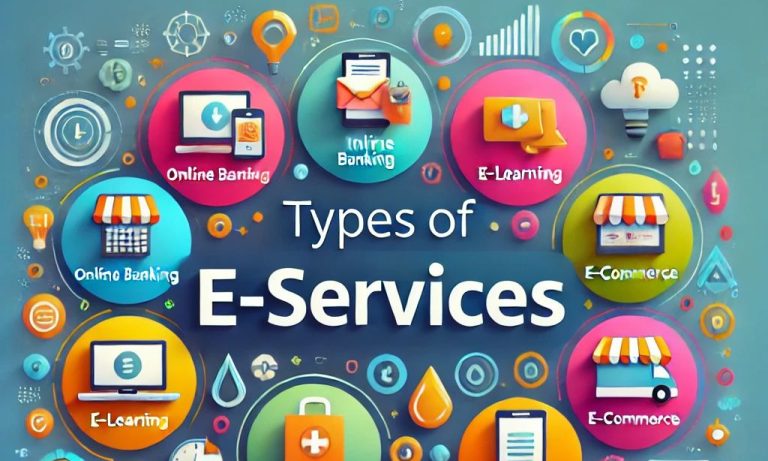In the digital age, types of e services have become an essential part of everyday life. E-services have revolutionized the way people interact with businesses and institutions-from online banking to government services. E-services are those services offered through the Internet, to make them more efficient, accessible, and convenient. The growing significance of e services is due to increasing dependence on digital platforms for one’s everyday needs. The embracing of e-services benefits not only businesses and government but also individuals to seek quick, affordable, and reliable solutions. This article will discuss what e-services are, the different types that exist, and why they are of importance in today’s world.
What is E-Services?
E services, or electronic services, are services delivered through electronic means, typically over the internet. They offer the convenience of accessing services remotely without the need for physical presence. E-services can range from simple activities like paying bills online to complex processes such as applying for government documents or managing a bank account.
E-services are not only limited to the private sector but have also expanded into the public sector, offering citizens the ability to access government services online. They include both free and paid services, making daily tasks much more accessible and efficient. The rise of e-commerce and online communication has significantly accelerated the growth of e-services.
In simple terms, e-services are digital solutions that save time, reduce costs, and increase accessibility by delivering services through the internet.
Types of E Services
There are numerous types of e services, each catering to different needs and sectors. Below are the major categories:
E-Commerce Services
E-commerce services allow individuals and businesses to buy and sell goods or services online. These are the most common type of e-services, including:
- Online Shopping: Platforms like Amazon, eBay, and Etsy provide a marketplace for consumers to buy products.
- Online Payment Systems: Payment gateways such as PayPal, Stripe, and Google Pay allow users to make secure payments online.
- Digital Goods and Services: This includes purchasing digital products like eBooks, software, and music.
E-Government Services
These are services offered by government agencies through digital platforms. E-government services have transformed how citizens interact with government bodies. Examples include:
- Online Tax Filing: Governments provide tax filing services through websites, enabling individuals and businesses to file taxes online.
- E-Voting: In some countries, citizens can cast their votes in elections through secure online platforms.
- Permit and License Applications: Individuals can apply for various government permits or licenses, such as driving licenses or business permits, online.
E-Banking and Financial Services
E-banking services are offered by banks and financial institutions to manage accounts, make transactions, and access financial tools. Examples include:
- Online Banking: Allows users to check account balances, transfer money, pay bills, and apply for loans via the Internet.
- Mobile Payment Systems: Mobile wallets like Apple Pay or Google Wallet enable users to make payments directly from their smartphones.
- Stock Trading Platforms: Services like E*TRADE and Robinhood allow users to buy and sell stocks online.
E-Learning Services
E-learning has gained immense popularity, offering educational opportunities over the Internet. These services provide access to courses, tutorials, and certifications without the need for physical attendance. Examples include:
- Online Courses: Platforms like Plutus Education, Coursera, Udemy, and Khan Academy offer courses on a variety of subjects, ranging from languages to data science.
- Virtual Classrooms: Educational institutions provide online classes and webinars for students of all ages.
- Skill Development Platforms: Websites like LinkedIn Learning focus on skill development through video tutorials and assessments.
E-Healthcare Services
E-health services aim to provide healthcare solutions through digital platforms, improving access to medical care. Examples include:
- Telemedicine: Platforms like Teladoc and Doctor on Demand allow patients to consult doctors remotely via video or chat.
- Online Pharmacy Services: Customers can order medications and have them delivered to their doorstep through services like Walgreens and PharmEasy.
- Health Monitoring Apps: Apps like MyFitnessPal and Fitbit track health metrics and offer personalized fitness advice.
E-Ticketing and Reservations
E-ticketing services allow people to book tickets for travel, events, and services online. Examples include:
- Airline Ticket Booking: Platforms like Expedia and Skyscanner allow users to compare prices and book flights online.
- Hotel Reservations: Services like Booking.com and Airbnb offer accommodations that can be booked remotely.
- Event Ticketing: Websites like Eventbrite and Ticketmaster allow users to purchase tickets for concerts, shows, and sports events.
E-Entertainment Services
These services focus on providing digital entertainment, such as music, movies, games, and live streaming. Examples include:
- Streaming Platforms: Services like Netflix, Spotify, and YouTube allow users to watch movies, listen to music, or view video content on demand.
- Online Gaming: Platforms like Steam and PlayStation Network offer a variety of games for download or streaming.
- Live Streaming: Services like Twitch and Facebook Live allow individuals or businesses to stream live events, webinars, or gaming sessions.
Importance of E Services
The importance of e services cannot be overstated, as they bring a wide range of benefits to individuals, businesses, and governments. Below are some reasons why e-services are crucial in today’s digital era:
- Convenience and Accessibility: E-services allow users to access services anytime, anywhere, as long as they have an internet connection. This convenience saves time and offers flexibility, especially for people with busy schedules.
- Cost-Effective: By reducing the need for physical locations, paperwork, and in-person interactions, e-services help businesses and governments save costs. These savings are often passed on to consumers in the form of lower prices or more affordable services.
- Faster Processing: E-services streamline processes, making tasks like applying for government permits, making payments, or booking services faster and more efficient. The time saved can benefit both service providers and customers.
- Increased Reach and Inclusivity: E-services break down geographic barriers, allowing people from rural or remote areas to access services that were previously unavailable to them. This inclusivity helps bridge gaps in access to important services like education, healthcare, and financial support.
- Improved Customer Experience: With easy-to-use interfaces, personalized options, and a more efficient service delivery model, e-services offer a better overall experience for customers. They also provide a more transparent and responsive system, which builds trust and satisfaction.
E-Services FAQs
What are the types of e services?
The main types of e services include e-commerce, e-government services, e-banking, e-learning, e-healthcare, e-ticketing, and e-entertainment.
What is the importance of e services?
The importance of e services lies in their convenience, cost-effectiveness, faster processing times, broader accessibility, and the improved customer experience they offer.
Where can I find types of e services PDF?
You can download a types of e services PDF from various educational and government websites that provide detailed overviews and guides about e-services.
How do e services help in education?
E-learning services, such as online courses and virtual classrooms, allow individuals to access education at their convenience, making learning flexible and affordable.
How does e healthcare benefit patients?
E-healthcare services, such as telemedicine and online pharmacies, offer patients easy access to medical consultations, prescriptions, and health tracking from the comfort of their homes.


